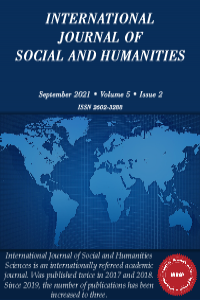BUILDING PUBLIC SECTOR COMPETITIVENESS THROUGH SOUND AND RESILIENT INTERNAL SYSTEMS: A CASE OF ZIMBABWE
Öz
Building internal control systems of an organization is vital for resource utiliza-tion, accountability and its competitiveness. Public sector supply chains play an important role in service delivery of goods and services to the general public. There is need for strong internal systems in the public sector because they are funded from taxpayers’ money. Countries with intact public sector management systems progressively develop toward equality and attainment of Sustainable Development Goals. This was a case of the Public Sector Supply Chain Man-agement in Zimbabwe. An exploratory research design was adopted. Qualitative and quantitative instrumentation were used. The target population were consum-ers (3574) of goods and services from Health Sector Supply Chains, Water Sup-ply Chains and Agrisupply Chains. A sample size of 347 was used for repre-sentativeness. Both random and purposive sampling techniques were used. The study found out that the internal environment of public sector supply chains was prone to abuse from external political forces which disrupted the normal func-tioning of systems leading to opportunistic moments of abuse by insiders. The study recommends a change in political culture and strong commitment from politicians to improve operational efficiency of public sector supply chains.
Anahtar Kelimeler
Internal Control Systems Public Sector Accountability Efficiency Resource Utilization
Kaynakça
- Bohari, A.A.M. (2019). Exploratory Research as the way forward towards a green procurement practices for the construction industry; Research Methodol-ogy, IOP Conf. Ser.: Earth Environ. Sci. 385 012054
- Bratton, J., and Denham, D. (2019). Capitalism and Classical Social Theo-ry, Paperback.
- Chigudu, D (2014) Public Procurement in Zimbabwe: Issues and Chal-lenges, Journal of Governance and Regulations, Vol. 3(4).
- Cole, N. (2015). Effective Public Resources Management: Paving the Way for Sustainable Economic Growth and Development, Africa Policy Re-view.
- Collins Paperback Dictionary, (2009), 6th Edition, Harper Collins, Pub-lisher, Glasgow.
- Conradson, D., and Pawson, E. (2009). New Cultural Economies of Mar-ginality: Revisiting the West Coast, South Island, New Zealand, Journal of Rural Studies, Vol. 25 (1).
- Crown Commercial Service (2016). Handbook for the Concession Con-tracts Regulations, CCS, UK.
- Daly, H. (2015). Conflicts of Interest in Agency Theory: A Theoretical Overview, Global Journal of Human Social Science Research, Vol.15. No.1.
- Desai, N. (2020). Understanding the Theoretical Underpinnings of Corpo-rate Fraud. The Journal for Decision Makers, Vol.45 (1). International Confer-ence on Education for Economics, ISSN (Print) 2540-8372.
- Dommett, K., MacCarthaigh, M., and Hardiman, N. (2016). Reforming the Westminster Model of Agency Governance: Britain and Ireland after the Cri-sis, Wiley Online Library.
- Dorminey J. A. S., Fleming, M. J., Kranacher dan R. A., and Riley, Jr. (2010). Beyond The Fraud Triangle: Enhancing Deterrence of Economic Crimes. The CPA Journal July 2010.
- Gechkova, T and Kaleeva, T (2018). The McKinsey 7S Model in the Air-port System Protection. Knowledge- International Journal Vol.42.5
- Goto, T and Tagwira, F. (2020). An Analysis of Alternative Water Sources in Budiriro Suburbs, Harare, ResearchGate.
- GoZ. (2013).The constitution of Zimbabwe Amendment (No.20) Act, Government of Zimbabwe.
- GoZ. (2018). Public Entities Corporate Governance Act Chapter 10:31, No.4 of 2018. Government of Zimbabwe.
- GoZ. (2020). National Development Strategy 1, 2021-2025, Ministry of Finance and Economic Development, Government of Zimbabwe.
- Jenks, G.F. (1967). The Data Model Concept in Statistical Mapping, In-ternational Yearbook of Cartography, 7.
- Kidia, K .K. (The Future of Health in Zimbabwe. Global Health Action, 11 (1).
- Kothari, C.R. (1998). Research Methodology: Methods and Techniques, New Age International (P) Limited Publishers.
- Mahsina, M., Poniwati, A., and Hidayati, K. (2016). Coso Framework: An Internal Audit & Effectiveness Analysis of Banking Internal Control on Credit Investment Aspect, Business, and Finance (ICEEBF) 2016 ISSN (Online) 2540-7481.
- Manor, N. and Abdullah, R.M. (2015). Fraud Triangle Theory and Fraud Diamond Theory: Understanding the Convergent and Divergent for Future Re-search, ResearchGate.
- Martens, F., and Rittenberg, C. (2020). Using Risk Appetite to thrive in a Changing World, coso.org, retrieved 4 June 2021
- Moyo, N. A. G. (Ed.). (1997). Lake Chivero: A Polluted Lake, University of Zimbabwe Publications, Harare, Zimbabwe.
- Namazi, M. (2013). Role of Agency Theory in Implementing Manage-ment’s Control, Journal of Accounting and Taxation, Vol.5 (2).
- Nel, E., and Stevenson, T. (2011). Demographic and Economic Change in Small Towns in New Zealand and the Responses to Marginalization, Springer.
- Nhapi, I. (2009). The water situation in Harare, Zimbabwe: a policy and management problem, Water Policy 11, 221-235.
- Ofori-Mensah, M. (2017). Access to Basic Public Services: Challenges Ghana must Overcome, IEA, Ghana.
- Siljeg, A., et al. (2016). Accessibility Analysis of Urban Green Spaces in the Settlement of Zadar (Croatia), ResearchGate.
- Statutory Instrument 144 of 2019, (Chapter. 22:11), Public Finance Man-agement (Treasury Instructions) Section 16, GoZ.
- Stebbins, R. (2001). Exploratory Research in the Social Sciences: What is Exploration? ResearchGate.
- Transparency Development International. (2021). A Report on Corruption in the Public Health Sector in Zimbabwe, TIZ.
- Van de Walle, S. (2018). Explaining Citizen Satisfaction and Dissatisfac-tion with Public Services, ResearchGate.
- Wolfe, D., and Hermanson, D. R. (2004). The fraud diamond: Consider-ing four Elements of Fraud, The CPA Journal, 74 (12), 38-42.
Ayrıntılar
| Birincil Dil | İngilizce |
|---|---|
| Bölüm | Araştırma Makalesi |
| Yazarlar | |
| Yayımlanma Tarihi | 30 Eylül 2021 |
| Yayımlandığı Sayı | Yıl 2021 Cilt: 5 Sayı: 2 |

